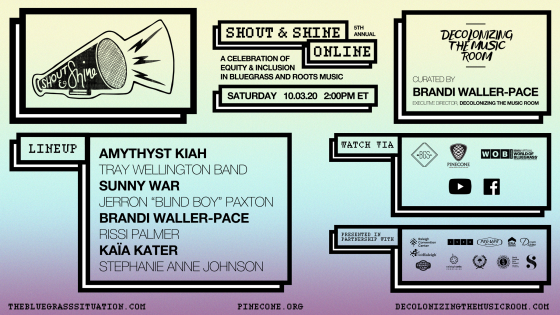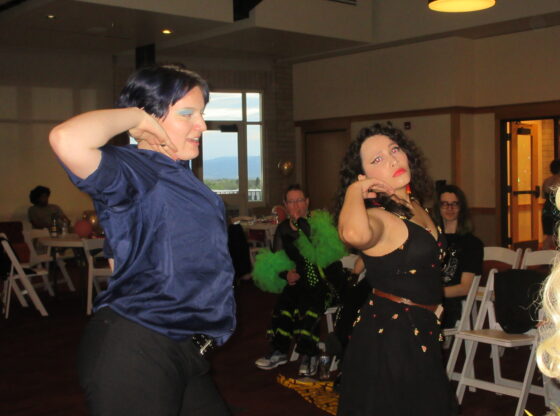In 2016, North Carolina violated civil rights with the transphobic passage of House Bill 2. It animated the bluegrass community to create Shout & Shine, a celebration of diversity, equity and inclusion in the genre of bluegrass and roots music. Five years later, on Oct. 3, the fifth annual virtual event was held in dedication to the Black Lives Matter (BLM) movement.
The performances were curated by Brandi Waller-Pace, the founder of a nonprofit organization called Decolonizing the Music Room. Their work centers “BBIA (Black, Brown, Indigenous and Asian) voices, [using their] knowledge and experiences to challenge the historical dominance of white Western European and American music, narratives and practices.”
Brandi Waller-Pace explained that “Shout & Shine is all about creating space for under-represented and marginalized folks who make and love bluegrass. This year’s decision to feature all Black artists, musicians and creators is in direct response to the current iteration of BLM and the righteous rebellion against police brutality and systemic racism in our country.”
The featured artists contributed pieces from a diverse spectrum of root music genres: bluegrass, country, blues, old-time and ragtime. Some were unique combinations of multiple styles.
The lineup consisted of Amythyst Kiah, the Tray Wellington Band, Sunny War, Jerron “Blind Boy” Paxton, Brandi Waller-Pace, Rissi Palmer, Kaïa Kater and Stephanie Anne Johnson.
The origins of bluegrass music are typically attributed to Ireland and Scotland. However, the Folkways music publication states that the genre is truthfully a “synthesis of American southern string band music, blues, English, Irish and Scottish traditions, and sacred and country music.”
Performer Kaïa Kater explained that when she discovered her passion for the banjo, she felt “out of place.” Banjo musicians of color are not prominent within the industry, despite the instrument’s origins in the African continent. To her, it validated the need for decolonizing efforts.
Jerron “Blind Boy” Paxton affirmed that throughout the Black community’s history of migration and diaspora, they brought their own cultures with them. As a result, they were influenced by existing musical genres while influencing said genres themselves.
“The blues come from deep within the culture of Black folks. When Black people left the south, they brought the blues with them. It was a common way of communicating with people born outside of your state or region,” said Paxton.
Kater’s record “Grenades” was inspired by the “intergenerational trauma” that began with her father’s life and continued into her own. The United States invaded her father’s homeland of Grenada, forcing him to flee as a refugee to Canada. The trauma experienced by her father had an influence on her life.
“So much of my childhood was spent trying to find my place in the world and figure out what it means to be mixed-race,” said Kater.
Music and oral tradition have always been a method of communication, social critique and expression for the Black community, but musician Amythyst Kiah welcomed the power of music as a tool to build community and heal.
“Despite all of the things happening in the world right now, I hope that we can share some music together. I think we all need that right now.”
The Shout and Shine showcase is an example of a decolonizing event that appreciates the quality artistry of Black musicians by providing a platform for education, history and perspective. The event can be viewed on YouTube.











